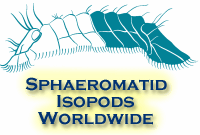| Abstract |
The sex ratios of the progenies of woodlice Porcellionides pruinosus (Crustacea, Isopoda) raised at different temperatures were studied. Females from three French populations sampled in the wild produced highly female-biased broods at 20 degrees C and male-biased broods above 30 degrees C. The effect of high temperature was not due to selective mortality of females. Sex determination was thus sensitive to temperature in P. pruinosus. We also found an interpopulation variability of sex ratio thermosensitivity and a weak inheritance of male-biased sex ratios at high temperatures. Samples taken from a wild population throughout the year showed that while the thermal conditions required for changes in the sex ratio occurred, there was no significant variation in the sex ratio. On the other hand, almost all the females and many males in the four populations studied harboured intracytoplasmic bacteria. These maternally inherited symbionts belong to the genus Wolbachia and are known to possess a feminizing effect. While in other arthropods Wolbachia are destroyed at high temperatures, the symbionts of P. pruinosus were detected by a PCR procedure whatever the rearing temperatures. In light of these results, we propose that the thermosensitivity of sex determination in P. pruinosus could reflect the removal of the cytoplasmic effect on sex determination rather than environmental sex determination sensu stricto. The reduction in the amount of bacteria (but not their entire elimination), or the inhibition of bacterial metabolism, may be responsible for sex ratio variations relating to temperature. The incomplete inheritance of male-biased sex ratios at high temperatures might reflect a selection of thermo-tolerant bacterial strains. |

















